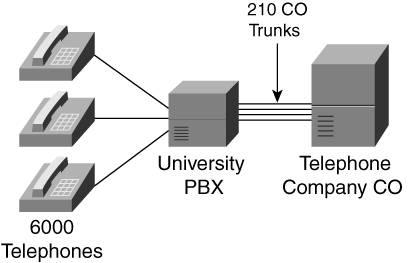Private Branch Exchanges: How Big Businesses Talk
| I used to work on the telephone system at a university, and the university had about 6000 telephones on campus. How much do you think it would cost for each one of those phones to have a direct connection back to the local CO? In those days (the early 90s), a business line had a recurring monthly charge of approximately $40. That comes out to $240,000 every month for local phone service for those 6000 phones! There must be a more economical approach. One such approach was for the university to have its own phone switch. That's right. A private entity such as a business or university can have its internal phones connect to its own phone switch instead of the local CO. That private phone switch then connects to the local CO over a series of trunks (analog and/or digital, which are discussed Chapter 3, "Paving the Pathway to a Voice over IP Network"). The good news is that 6000 trunk connections back to the local CO were not required because statistically speaking, all 6000 phones would never be in use at exactly the same time. In fact, based on traffic studies (a topic covered in Chapter 2, "Making Waves: Turning Your Voice into Zeros and Ones"), we needed approximately 210 trunk lines (that is, voice paths) interconnecting the university's phone switch with the local CO, as illustrated in Figure 1-3. Figure 1-3. University Telephone System Admittedly, there are other costs associated with having a private phone switch. For example, we had to pay a maintenance contract to have a technician onsite, and we had to purchase the phone switch itself (which was approximately $3 million back in the late 1980s). However, when considering the vast discrepancy in recurring monthly phone line charges, the economies of scale are clear. Assuming each of those 210 trunk lines costs $40 per month, the total monthly "phone bill" would be $8400. When compared with an earlier calculation of $240,000 per month, that's a savings of $156,000 per month! Large businesses typically select private branch exchanges (PBXs) to act as their privately owned phone switches. PBXs are available in a wide variety of shapes and sizes and typically support 20 to 20,000 phones. Most PBXs are "feature-rich," offering voice mail, music-on-hold, call transfer capabilities, and many other features. However, the relatively large initial cost of a PBX might not give a smaller business a satisfactory return on investment (ROI). The alternative for a smaller business is an entry-level phone switch called a key system, as described in the following section. |
EAN: 2147483647
Pages: 138
